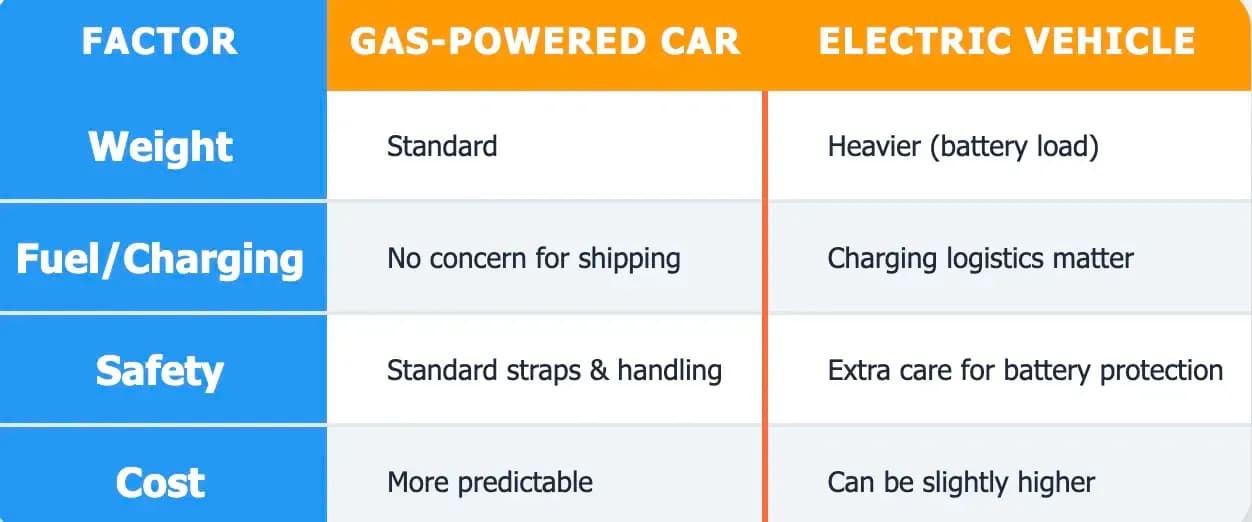
The Rise of Electric Vehicle Shipping: Special Considerations
Electric cars (EVs) aren't only the future; they're here now. EV adoption is going through the roof, from Teslas driving around on California highways to Rivians driving into little villages. The car transport business now has a new problem to solve: how to ship more electric vehicles securely and quickly. The foundations of shipping cars are the same for EVs, but there are several things that make transporting them a little different. If you work for a dealership and need to move cars, or if you're a driver moving, or if you're a carrier trying to get in on the electric vehicle wave, it's important to know the special things to think about when shipping electric vehicles.


Tell us about your project
Click the button to start! We are here to be part of your car shipping story. Let's create a lot to tell!
What Makes EV Shipping Different?
Transporting an electric car looks the same as transporting a gas-powered car at first. But there are several things with EVs that are different:
- Weight of the battery: Electric vehicles (EVs) are frequently heavier than regular cars since they have lithium-ion batteries. This can change the loading, kind of trailer, and fuel efficiency for carriers.
- Charging Needs: If you drive an EV onto or off a trailer, you need to plan ahead for charging stops, which is different from gas cars.
- Special Handling: Drivers need extra training and equipment to handle batteries safely so they don't overheat or get damaged.
Quick Comparison: Gas vs. Electric Shipping

Gas vs. Electric Shipping
Costs: Why EV Shipping Can Be Pricier
People often ask us at Revoway, "Why does it cost more to ship an electric vehicle?" This is how it works:
- Weight Impact: More weight from the battery means fewer vehicles can fit on one truck, which raises the cost per car.
- Insurance: EVs normally cost more, which might make insurance premiums go up.
- Special Equipment: You might need flatbed trailers, enclosed carriers, or equipment that is safe for batteries.
The bottom line is that EV shipping can cost a bit more than regular shipping, but the extra cost is worth it for peace of mind and good treatment.
Safety Considerations for EV Shipping
EVs are high-tech vehicles, but they are also fragile when it comes to transportation. Safety is the most important thing, and here's what you need to know:
- Battery Precautions: Before shipment, the battery should be charged to around 30–50% (not full or empty). This makes the system less stressed.
- Enclosed Transport → Many EV owners choose enclosed trailers for extra protection against weather and road debris.
- Proper Loading: Because of how heavy they are, EVs need to be carefully secured to avoid damage.
Tip: Always let your transportation company know that your car is electric. That way, they can assign the right type of carrier and driver for the job.
Who Benefits from EV Shipping?
The rise of EV shipments affects more than just the owners of these vehicles. Here's who will benefit:
- Dealerships: Getting rid of EV stock swiftly to meet rising demand.
- Carriers: Getting into the EV transport business opens up a profitable, fast-growing opportunity.
- Drivers: Professional shipping keeps your car secure and stress-free, whether you're moving, selling, or buying an EV out of state.
- Auction Houses and Fleets: As electric vehicles (EVs) become more common on the used market, the need for reliable shipment is only growing.
Bottom Line
Electric cars are here to stay, and so is the need for special shipping. Transporting electric vehicles (EVs) is a little more complicated than shipping regular cars. Knowing these differences can save dealerships, carriers, and everyday drivers time, money, and trouble.
We are ahead of the curve at Revoway. We have a lot of expertise with EVs of different kinds and sizes, so we can safely and reliably deliver them anywhere in the country. As more and more people buy electric vehicles, it's not just wise to have a reliable shipping partner; it's necessary.
FAQ
1. Is shipping an EV more expensive than a regular car?
Yes, most of the time. The extra weight of the battery, the increased value of the vehicle, and the need for specific handling can all raise the cost, but the difference makes for safer transit.
2. Do I need to prepare my EV before shipping?
Yes. Charge the battery to 30–50%, take out any personal things, and tell the shipping firm that it's an EV so they can send the correct carrier.
3. Can electric vehicles be shipped long-distance?
Yes, for sure. Like gas-powered cars, electric vehicles can be shipped all across the country. Carriers will design the routes and equipment to make sure your EV gets there safely.
Stay curious to learn more. Find the answers or solutions to your concerns with Revoway. Let’s get to know shipping industry better!


What is the best time of the year to ship your car?
Understanding the best time of the year to ship your car determines how much it costs to your wallet and how much stress you experience. So many car owners often ask this question - this blog is designed to give you all the answers you need. The truth is: there's no one-size-fits-all solution. While there are seasons when shipping is cheaper, faster, and less stressful, it all depends on weather and traffic patterns across the U.S. (for U.S. residents).